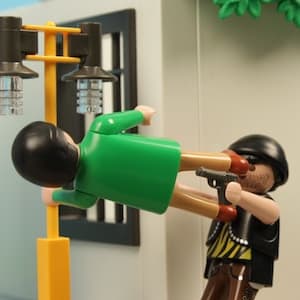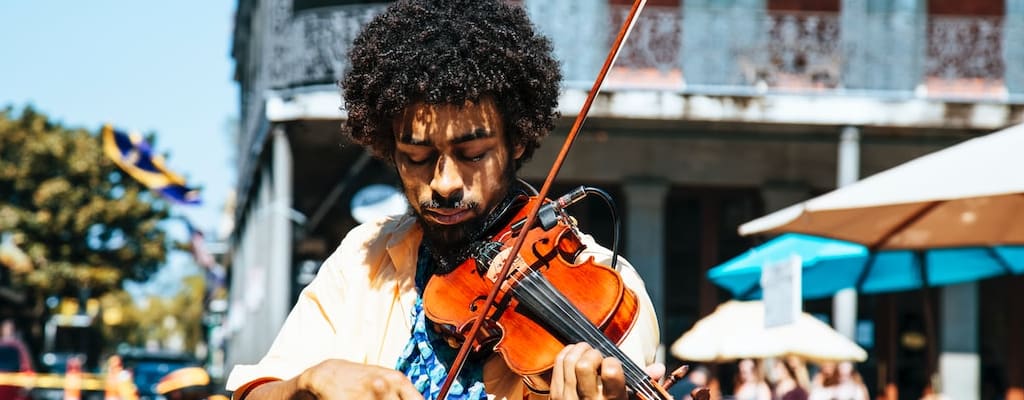play along: Idiom Meaning and Origin
What does ‘play along’ mean?
The idiom "play along" means to pretend to agree or go along with something, usually for the sake of keeping the peace or avoiding conflict.

Idiom Explorer
The idiom "sing along" means to join in and sing a song with others who are already singing it. It implies active participation and engagement in a collective musical experience.
The idiom "play it cool" means to remain calm and composed in a situation, especially when feeling nervous or under pressure. It involves maintaining a nonchalant or unaffected attitude to hide one's true emotions or intentions.
The idiom "play hooky" means to skip school or work without permission or a valid reason.
The idiom "play hob with" means to cause trouble or disruption, often leading to negative consequences or difficulties.
The idiom "play games" means to behave in a deceptive or manipulative way, often for personal gain or advantage.
The idiom "play for time" means to delay taking action in order to gain more time or to avoid making a decision immediately.
The idiom *play for love* means to engage in an activity solely for personal enjoyment or passion, without any expectation of financial gain or external recognition.
The idiom "play down" means to minimize or downplay the importance or significance of something, often by making it seem less serious or less significant than it actually is.
The Elusive Performance
The idiom "play along" has several meanings and uses in the English language. It can be used in various contexts, both literal and figurative. Let's explore the different facets of this idiom, shedding light on its origins, variations, and common usage.
One of the most common uses of "play along" is in the sense of participating or going along with something, often to maintain harmony or avoid conflict. For example, we might say "play along with the joke" or "play along with someone's idea." In these situations, the idiom suggests a willingness to cooperate and engage in a particular scenario, even if we might not completely agree or believe in it. It's a way to keep things running smoothly and foster a positive atmosphere.
Another related idiom is "go along to get along." This phrase conveys the idea of conforming to a group or situation in order to avoid conflict or maintain good relationships. It's similar to "play along" in that it involves going along with something, but "go along to get along" emphasizes the motivation of maintaining harmony and getting along with others, while "play along" is more focused on participating in a specific scenario or activity.
In the realm of acting, "play along" takes on another meaning, specifically in the context of improvisation. Actors often use this idiom to mean spontaneously following the lead of another performer in a scene. It implies the ability to adapt and respond in real-time, without planning or rehearsal. This usage showcases the collaborative nature of theatrical performance and the importance of supporting and building upon each other's ideas and actions.
Similarly, the idiom "go along with" can be related to this meaning of "play along." When we say we will "go along with" someone's suggestion or plan, we are expressing our agreement and willingness to support and participate in their idea. It's about being open-minded and embracing the suggestions and contributions of others.
"Play along" can also refer to engaging in a musical performance, either as part of a band or ensemble, or in a solo setting. Musicians commonly use this phrase to indicate their participation and contribution to a piece of music, whether they are following the established structure or improvising within it. It embodies the idea of actively participating in the creation of a harmonious musical experience.
When we use the phrase "play along with," it conveys the notion of cooperating with others in a musical context. We might play along with a melody or rhythm, following the lead of the other musicians. It's about working together to create something beautiful and cohesive.
The origin of the idiom "play along" can be traced back to the early 19th century. Its earliest known usage is documented in theatrical contexts, where actors were encouraged to "play along" with each other's improvisations and contribute to the overall scene. Over time, the phrase expanded its range of meanings and became more widely used across different domains.
The idiomatic expression "play along" encompasses various ideas of participation, cooperation, and adaptation. It captures the essence of active engagement and collaboration. Through humorously going along with a joke, improvising in a scene, or contributing to a musical performance, this phrase reflects the versatility of language and the myriad ways in which idioms enrich our communication.
Another related phrase is "go along with." When we say we will "go along with" someone's suggestion or plan, we are expressing our agreement and willingness to support and participate in their idea. It's about being open-minded and embracing the suggestions and contributions of others.
Throughout the years, the idiom "play along" has evolved and adapted to suit different contexts and situations, yet its essence remains resilient and timeless. Whether in a playful sense, in the world of theater, or within the realm of music, this idiom continues to capture the spirit of cooperation, participation, and collaboration.
Example usage
Examples of how the idiom "play along" can be used in a sentence:
- John didn't want to reveal his surprise birthday party, so he had to play along with his friends' fake plans.
- The comedian asked the audience to play along with his joke by raising their hands, and everyone complied.
- Mary was skeptical about the game, but eventually decided to play along to avoid disappointing her friends.
More "Cooperation" idioms



